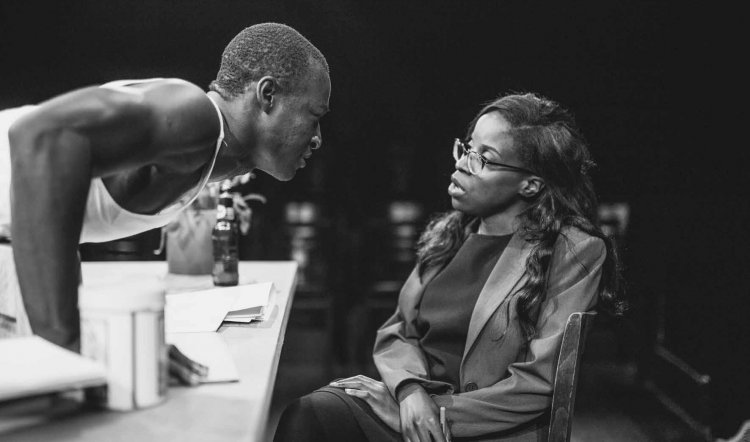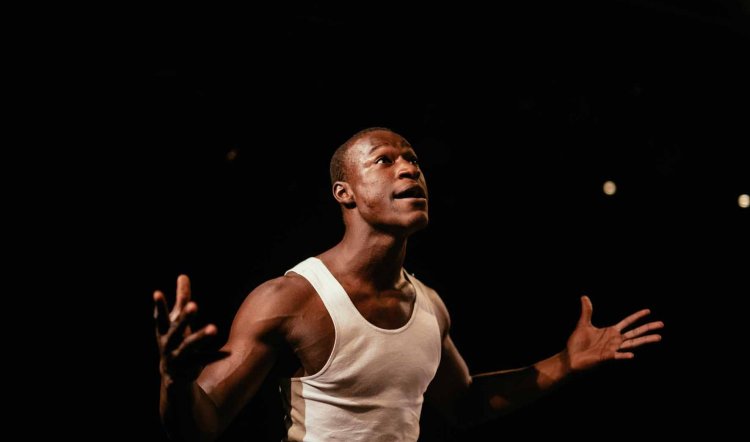
BLACK JESUS
BLACK JESUS, bAKEHOUSE Theatre at KXT, to 21 May 2016. Photography Nick McKinlay - above: Elijah Williams and Belinda Jombwe-Cotterill; right: Elijah Williams.
Written in 2013 and set in the future – 2015 – Anders Lustgarten’s play is about modern Zimbabwe and the corruption of its independence and revolution. It is different from yet similar to much of his work: dramatised and fictional exploration of real-time political or social horrors.
Although not talking about Black Jesus, he could have been when, in an interview with Richard Godwin in The Guardian, the playwright (a Londoner of American parentage) said, “…It’s always hypocrisy that makes me want to puke. At least with cruelty and exploitation, you know where you stand.”
Lustgarten was being interviewed about If You Don’t Let Us Dream, We Won’t Let You Sleep (2013). That was a take-down of mega-capitalism of which he said, again to Godwin, “Financial capitalism creates no value. It doesn’t actually produce anything – it just uses money to speculate on money. But it needs to be grounded on something, whether that’s mortgages, bailouts or, increasingly, social needs. That’s what’s going on economically, but most people don’t know that. There are things that are our rights, things that we have fought for, for hundreds of years. To take those things away is a crime.”
Human rights and their abuse is a recurring theme for Lustgarten: 2015’s, Lampedusa was inspired by the refugee crisis in the Mediterranean and the island where so many sought landfall while so many more died on the high seas. Writing about the play in HuffPost, Jessie Thompson said it: “tells the parallel stories of Stefano, whose job is to retrieve the bodies of migrants from the Med, and Denise, who funds her university degree with a job she loathes as a pay day loan collector.
“It examines the extent to which people are forced by systems to become complicit in institutional cruelty in order to make their living, but it also carries an uncompromisingly hopeful message of the redemptive power of ordinary human kindness.” She could also have been writing of Black Jesus.
This play is set in Zimbabwe in a time post-Mugabe (although as of today’s date the old bastard is still hanging on). Eunice Ncube (Belinda Jombwe-Cotterill) is a classic 21st century African woman: highly educated, westernised, privileged yet easily and predictably under-estimated. She is working as an investigator for the Truth and Justice Commission. Her task is to persuade the infamous “Black Jesus” – Gabriel Chibamu (Elijah Williams) – to give up those who once gave him orders and who, unlike him, are not languishing in jail but instead are driving around in Mercs – and still giving orders.
Gabriel was once a leading light in the “green bombers” – properly the National Youth Service, a ZANU-PF brain wave to "transform and empower youths for nation building through life skills, training and leadership development.” The green bombers (clad in militaristic camo outfits) were actually the perpetrators of gross crimes and terrorism against fellow citizens on behalf of the ruling clique.

Eunice vaguely promises Gabriel some kind of lenience if he spills the beans, but he will not. His almost casual psychopathy towards his victims is in mind-blowing contrast to the sense of honour he holds to when it comes to betraying those who abandoned him. It’s a pattern of behaviour that can be seen in civil war zones the world over and makes a grisly kind of sense as portrayed by Gabriel. (Marvellous, intelligent performance from Elijah Williams).
Eunice is also caught between the past and present. Her one time extra-marital lover, white lawyer Rob (Jarrod Crellin making the most of a thin role) is a reminder of her own contradictions, as are the childhood memories of Robert Mugabe coming to tea with her father and the little girl being fed sugar lumps by the hero of colonial struggle. Dichotomies abound in ex-colonial Africa: Rob is now discriminated against, feels stateless and is angry, heroes have become villains, absolute power has corrupted absolutely and on it goes.
Unfortunately for Eunice, she is caught in the classic political trap of the Minister (played with chill charm by Dorian Nkono) knowing the outcome he wants from her before she has even begun the investigation. And Eunice is still sufficiently idealistic (or naive) to not realise how deadly serious is this smooth operator. It’s a common enough predicament for a public servant – think Gillian Triggs – but in the Australian context at least, death and torture have yet to become part of the mix.
Lustgarten’s dense, short play is a rare treat for a Sydney audience. It’s packed with ideas, argument, drama and insights into the very essence of the personal being political. And although it’s Zimbabwe, there is much to ponder – uncomfortably – about this country and other “civilised” societies.
With Alex Jalloh punctuating and heightening the action from the sidelines on djembe, director Suzanne Miller draws fine performances from her actors, in particular the principals, Williams and Jombwe-Cotterill, and makes light of the tricky aspects of the venue (audience banked on two sides watching the actors side on).
Black Jesus is a tough and often shocking piece, always provocative and entertaining and leaves the audience with more questions than answers: truth and justice? Yes, they would be good outcomes but does one cancel out the other? If so, why? If not, why, how and where the hell are we going? Recommended.



